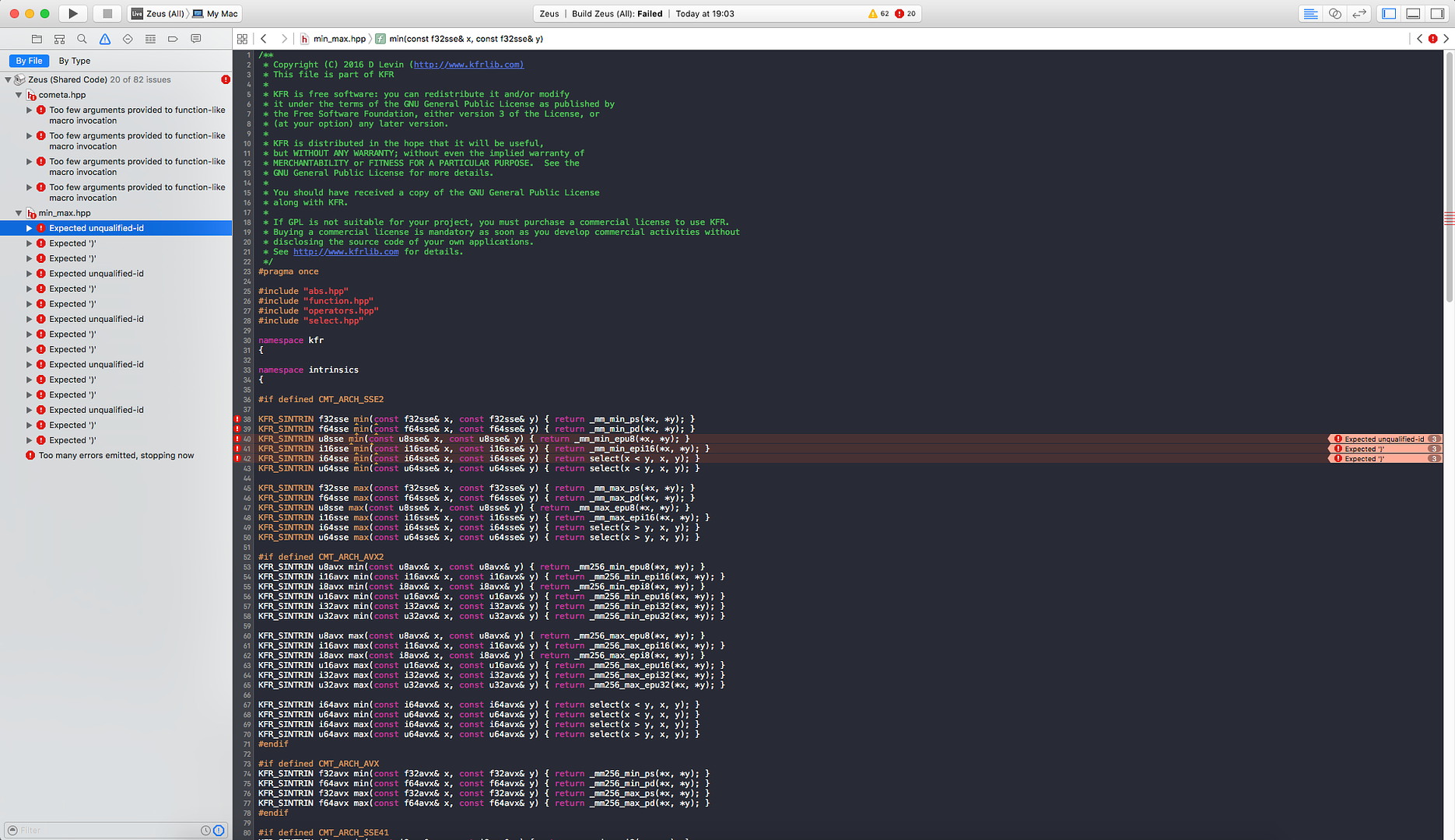Hello, I just included your Framework but got loads of errors on OS X in cometa.hpp and min_max.hpp:Chang-soo Kim wrote:Hi,

Any ideas what I'm doing wrong/ what the issue is?
Would love to try out some of kfr as it looks very nice
Dave
Hello, I just included your Framework but got loads of errors on OS X in cometa.hpp and min_max.hpp:Chang-soo Kim wrote:Hi,

Code: Select all
#define min(x, y) (((x) < (y)) ? (x) : (y))
#define max(x, y) (((x) > (y)) ? (x) : (y))Code: Select all
#undef min
#undef maxSince some headers like to define those, I've personally learned to always use (std::max)(a,b) which breaks macro-expansion so you never need to worry about it anymore.Chang-soo Kim wrote:Namespaces can isolate functions but not macroses.
C preprocessor that replaces min and max knows nothing about C++ namespaces.
Hi, sorry for the stupid question but I'm trying to generate a unipolar trivial sawtooth using kfr version 1.1.0 and having some difficulty. I'd expect the following LOC to give me the output, a double, using kfr::phasorChang-soo Kim wrote:KFR 1.1.0 has been released.
New features:
......
5. phasor function to easily setup oscillators
Code: Select all
kfr::fbase phasor_203 = kfr::phasor(calculatedFrequency, 44100);
Code: Select all
void reset() { counter = 0; }Code: Select all
auto ph = phasor(441.0, 44100.0);
univector<double, 2000> saw440hz_1 = sawtoothnorm(ph); // start from phase=0
univector<double, 2000> saw440hz_2 = sawtoothnorm(ph + 0.5); // start from phase=180deg
Agreed. I'll ask there next time.Chang-soo Kim wrote: I'm always ready to answer any questions, but if a question requires detailed explanation, it would be better to move our conversation to
gitter:
https://gitter.im/kfrlib/kfr
The speed at which the updates are released highly depends on how the framework helps developers to use and extend it.keithwood wrote:Liking the speed of updates.
Here is example of variable length biquad filter.keithwood wrote:Is it possible to create biquads of variable section lengths at runtime rather than compile time?
 Xhun Audio and JRR Shop Deals Week: Exclusive 50% Off
Xhun Audio and JRR Shop Deals Week: Exclusive 50% Off Cymatic Form Spring Sale: 65% Off Acousmatic Engine
Cymatic Form Spring Sale: 65% Off Acousmatic Engine FabFilter Celebrates 20 Year Anniversary - 30% Discount On All Plug-ins and Bundles
FabFilter Celebrates 20 Year Anniversary - 30% Discount On All Plug-ins and Bundles MeldaProduction offers 50% Off MAutoAlign, MStereoSpread, MDelayMB and MRingModulatorMB
MeldaProduction offers 50% Off MAutoAlign, MStereoSpread, MDelayMB and MRingModulatorMB Sounds And Effects Pure Acoustic Sale - 50% Off
Sounds And Effects Pure Acoustic Sale - 50% Off Pitch Innovations Spring Sale - Save Up To 50%
Pitch Innovations Spring Sale - Save Up To 50% Ueberschall Spring Sale - Loops and Samples up to 87% off
Ueberschall Spring Sale - Loops and Samples up to 87% off Spektralisk Offer: 70% off Modular Lab for Aalto, Ableton Live + Sample Pack
Spektralisk Offer: 70% off Modular Lab for Aalto, Ableton Live + Sample Pack Tone Projects Spring Sale - 30% off all plugins
Tone Projects Spring Sale - 30% off all plugins Cherry Audio Voltage Modular Spring 2024 SaleSee All #KVRDealsSee All KVR Marketplace Deals
Cherry Audio Voltage Modular Spring 2024 SaleSee All #KVRDealsSee All KVR Marketplace Deals© KVR Audio, Inc. 2000-2024
Submit: News, Plugins, Hosts & Apps | Advertise @ KVR | Developer Account | About KVR / Contact Us | Privacy Statement